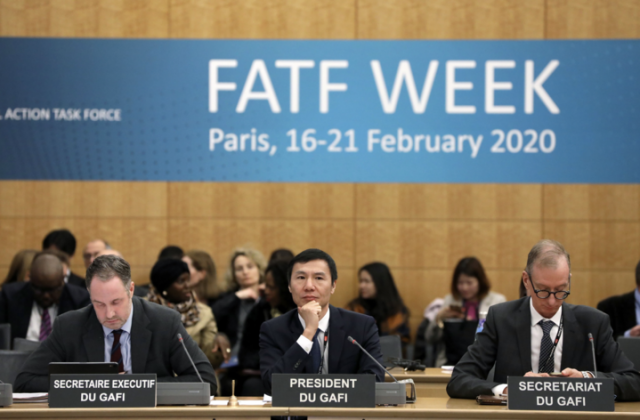Pakistan to toughen law for FATF goals
Public, private bodies may be empowered to curb money laundering and terror financing

The federal government has decided to grant regulatory powers to a set of public and private bodies to effectively regulate high risks businesses and professions that were prone to money laundering and terror financing.
The federal cabinet has recently approved amendments to the Anti-Money Laundering Act, 2010 -- for the second time in four months – that would now be placed before parliament for approval.
The parliament had also amended the anti-money laundering law four months ago but it fell short of the Financial Action Task Force’s (FATF) expectations.
The decision has been taken ahead of a meeting of the FATF’s joint group to address the legal deficiencies pointed out by the global watchdog.
A controversial change, which the parliament had struck down four months ago, was to declare money laundering a cognisable offence. However, it is again part of the proposed changes endorsed by the cabinet two days ago.
Currently, money laundering is a non-cognisable offence but the government has again proposed changes after which investigation officers would be empowered to arrest people without warrants and start an investigation without court permission.
The joint group is expected to meet in September to review Pakistan’s case before it is placed in front of the FATF plenary, which likely to take place in October.
Pakistan won a three-month further extension to complete its 27-point action plan because of the coronavirus pandemic.
The extended deadline was June this year but the FATF extended it due to the postponement of the FATF plenary.
A key change is the insertion of section 6A in the 2010 Act that would empower the government to designate the government and private entities as anti-money laundering/ counter financing. of terrorism (AML/CFT) regulatory authorities. The entities that are included in the schedule of the proposed bill are State Bank, Securities and Exchange Commission of Pakistan, Federal Board of Revenue, National Saving Schemes Supervisory Body and Pakistan Post Office.
In the private sector, the Institute of Chartered Accountants of Pakistan, Institute of Cost and Management Accountants and Pakistan Bar Council are proposed to be designated as AML/CFT authorities. These private entities are defined as self-regulatory bodies.
Each authority will issue a licence and register designated non-financial businesses and professions (DNFBPS) and financial institutions and any other person designated by the federal government in the official gazette.
The DNFBPs are real estate agents including housing authorities, builders, real estate developers and property dealers, dealers in precious metals and stones including jewelers and gem dealers, lawyers, notaries, other legal professionals and accountants, trusts and company service providers.
The authority is proposed to have the mandate to impose conditions on DNFBPs to conduct activities and impose sanctions, including monetary and administrative penalties on directors and senior management and officers who violate section 7A to 7H or on those who fail to comply with the targeted financial sanctions regulations.
In its various reports, the FATF Asia Pacific Group has declared these businesses and professions high risk areas that are prone to money laundering and terror financing.
Each designated authority will also cooperate with their foreign counterparts.
According to the proposed amendments, the DNFPBS would conduct customer due diligence, if it conducts occasional transactions above the prescribed threshold, on suspicion of money laundering or terror financing or has doubts over veracity of the data.
It would be the responsibility of the DNFBPs to identify the beneficial owner. The DNFBPs can obtain the services of the third parties to perform the due diligence of the customers. The reporting entities to the authority would maintain a record of all transactions for a period of at least five years.
If the reporting entity remains unable to perform the due diligence, it would not open the account, commence business relations or perform the transaction and would file a suspicious transaction report to the Financial Monitoring Unit.
No business transactions would be allowed on fictitious names and anonymity.
The government has also aligned the fines for offense of money laundering with the fines imposed under the Anti-Terrorism Act for natural persons and maximum penalty imposed under the Companies Act for legal persons.
Pakistan is required by the FATF to implement an action plan to bring its financial system in compliance with the international FATF standards on AML/CFT.
The government has proposed to omit the section 16 that gives investigation officers powers to arrest after obtaining warrants from the court or the judicial magistrate. The section is proposed to be omitted on the condition that the money laundering will be declared as cognisable offense.
Through an amendment in section 20, the government has proposed that the accused may be tried in any court, which is competent to try the offense instead of restricting the trial to the court which is trying the predicate offices. The reason given for the change is that it might be difficult to ensure trial of money laundering in the same court.
The government has also proposed that on failure to file a suspicious transaction report, a complaint can be filed before the court against such entities.



















COMMENTS
Comments are moderated and generally will be posted if they are on-topic and not abusive.
For more information, please see our Comments FAQ